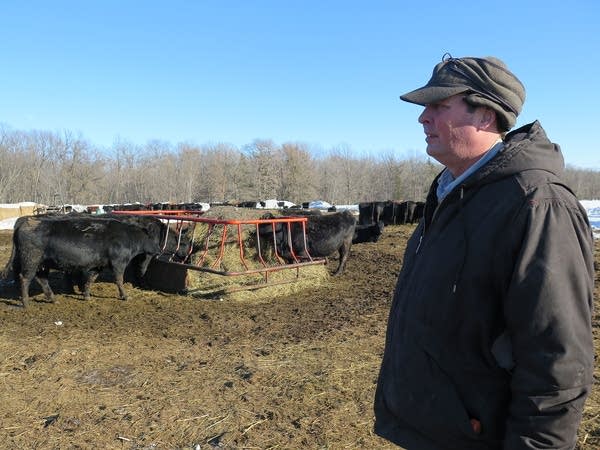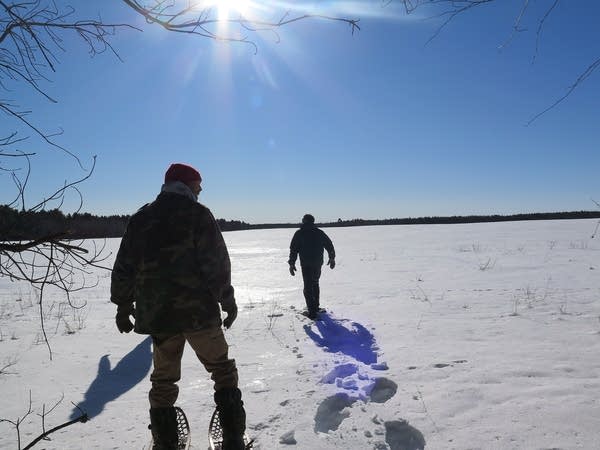In long-running dispute over water and land in Pineland Sands, a farmer is caught in the middle

Go Deeper.
Create an account or log in to save stories.
Like this?
Thanks for liking this story! We have added it to a list of your favorite stories.
Cattleman Tim Nolte thought he was doing everything right by the land in Wadena County that his family has been farming for decades.
He planted trees and cover crops to prevent erosion and protect the nearby Redeye River. He got certified in a state program to protect water quality.
But when Nolte bought 600 acres of neighboring land in hopes of irrigating about half of it to grow crops, he wasn't expecting the controversy that would follow.
"It gets to a level of anger where it's almost hurt,” he said. “That's the emotion that's in my house every day over this."
Turn Up Your Support
MPR News helps you turn down the noise and build shared understanding. Turn up your support for this public resource and keep trusted journalism accessible to all.
Nolte's plan has gotten caught up in a yearslong debate over changing land use in the Pineland Sands, which covers Wadena, Cass, Becker and Hubbard counties. His request for three water permits to irrigate about 300 acres in Wadena County came at a time of heightened concern over how widespread land use changes in the region — clearing forest to make way for growing potatoes and other row crops — is affecting the region’s land and water.
The Minnesota Department of Natural Resources ordered Nolte to undergo a study known as an environmental assessment worksheet before it would approve the three groundwater permits he's seeking.
The assessment, also known as an EAW, discloses information about the potential environmental impacts of a project. The person or business proposing the project must provide all the data for the EAW and covers most of the cost.
As part of the Nolte environmental assessment, the DNR is seeking to study the cumulative impacts of adding more irrigated farmland.
More than 100 people signed a petition asking for the review. They're concerned that the ongoing conversion of land that was once forest into row crops is leading to the degradation and overuse of the region’s groundwater.
From forest to potatoes
Much of that converted land once belonged to the Potlatch paper company. Potlatch sold off thousands of acres to private landowners, including R.D. Offutt, a major potato producer and a supplier to McDonald’s.
Potatoes need plenty of water, and the use of groundwater for irrigation in this region has increased dramatically in recent decades. That's raised concerns and prompted ongoing studies about whether it's affecting the aquifer and surface waters such as lakes and streams.
In 2015, R.D. Offutt heightened that concern when it applied for more than 50 well assessments and permits from the DNR. The DNR required Offutt to complete an environmental assessment worksheet first.
The company ended up withdrawing all but five of the requests, and the DNR didn’t require the review of the smaller number of permits. But Randall Doneen, conservation assistance and regulation manager for the DNR, said the issue didn't go away.
"We were concerned that even if right now we only have five, there will be more, and we will be faced with the same question of sustainability,” Doneen said.
The sandy soils that give the Pineland Sands its name also allow nitrates from fertilizer to travel easily into groundwater, the source of drinking water for the majority of area residents.
Recent tests have found more than 10 percent of the private wells in some townships have nitrate levels above the state health standard for drinking water, Doneen said.
In 2019, the DNR requested funding from the Legislature to fund a broader study of the environmental impacts of the land changes happening in the Pineland Sands. State lawmakers didn’t approve the funding.

And though land conversion and groundwater permit requests have slowed since 2015, they do keep coming. Doneen said the DNR has been carefully evaluating those requests, knowing that each one can contribute to the larger problem.
The Nolte expansion might be a small piece of the puzzle, he said, but “each little piece that you add on is adding another little increment of impact.”
Impacts of a changing landscape
Mike and Jennifer Tauber are among the local residents who've been raising the alarm about the environmental effects of the land use changes in this region.
They built their house 25 years ago in the woods of rural Backus, near the Badoura State Forest. Since then, they've seen the area change. The land next to theirs, which was once owned by Potlatch, is now a vast, open field, where R.D. Offutt grows potatoes.
"We actually would pick blueberries on the front portion over there quite often,” Mike Tauber said. “So to see it all scraped off was pretty bewildering."

The Taubers have been pushing for the DNR to require environmental reviews before allowing more irrigation. They say they don’t have anything against the Noltes, whose farm is about 40 miles southwest of their home.
But the Taubers worry about the impact of chemicals sprayed on nearby fields. And they fear that the clean drinking water this region has long enjoyed is changing.
"It's really high-quality water. You don't need a softener. It's wonderful to drink,” Mike Tauber said. “Nature does a great job of filtering water, but as soon as you put chemicals on, there's no organic matter in this ground to hold the chemical."
‘Put through hell’
Tim Nolte said he wants to grow hay and corn on the land for his cattle. But some residents worry if he gets the irrigation permit, he’ll lease the land back to R.D. Offutt to grow potatoes.
Nolte’s eyes tear up as he talks about how he hopes that adding more cropland will give his children a chance to keep farming. He said he doesn't know if he can afford to keep the land while also paying thousands of dollars for the environmental assessment.
"There's a reason why we get very emotional because we have a lot of labor stuck into this thing,” he said. “To walk away from what we got into it, the money and the labor — a ton of labor — it's gonna be difficult."

State Rep. John Poston, R-Lake Shore, whose district includes the Pineland Sands, said the Nolte family has been singled out unfairly.
"They're doing everything in my mind that they can do to be good conservationists of the land and the water. They're doing the right thing for their family,” Poston said. “And they've been kind of put through hell with this process."
‘Come a long way’
The DNR expects to have a draft environmental assessment worksheet of the Nolte expansion completed in about a month. After a public comment period, the agency will decide whether a more in-depth study is needed.
Regardless of what happens with the Noltes’ farm, the broader question over how to manage changes to this region's land and water are likely to persist.
Much of the nitrate contamination in the Pineland Sands comes from old farming practices that are falling by the wayside, said Keith Olander, dean of agricultural studies at Central Lakes College in nearby Staples.
"We've come a long way as a whole region, in terms of how we're maintaining water quality and treating water much differently,” Olander said. “We can't change what the numbers are from 20 or 30 years ago. We can change going forward, so they're not going to get any worse."
R.D. Offutt declined an interview request. On its website, the company touts its sustainability efforts, including reducing phosphorus and nitrogen use, using forecasting models to determine when and how much fertilizer and pesticide to apply, and using low-pressure irrigation nozzles.
Olander said more farmers are adopting those types of precision agriculture techniques to make sure they're not applying more water or nitrogen than their crops need.
"We do a lot of water quality studies where we're tracking the leaching of movement of nutrients down through our soil, and we have got some pretty good practices in place to mitigate that,” he said. “It's just, how do we get all farmers to adopt that as quick as they can, within the scope of the dollars that they have to work with?”
Dear reader,
Political debates with family or friends can get heated. But what if there was a way to handle them better?
You can learn how to have civil political conversations with our new e-book!
Download our free e-book, Talking Sense: Have Hard Political Conversations, Better, and learn how to talk without the tension.



